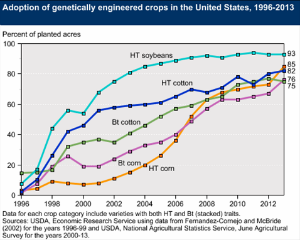According to a recent article from Agri-View, soybean varieties enhanced by biotechnology can help farmers improve soybean farming practices. Biotechnology reportedly helps soybean farmers increase yields and manage weeds, pests, and diseases.
The article claims biotechnology can also make soybean farming more environmentally friendly. “Among other benefits,” states Agri-View, “these varieties allow farmers to reduce their tillage and make fewer trips through the field in a tractor, bringing several sustainable-farming benefits, including: reduced fuel use, fewer greenhouse-gas emissions, less soil compaction, and less soil and water runoff.”
Soybean farmers across the U.S. seem to be adopting sustainable farming practices in order to enhance crops. According to the
As the soybean harvest progresses, farmers not already taking advantage of biotechnology may want to consider doing so in order to enhance crops and practice sustainable farming.
